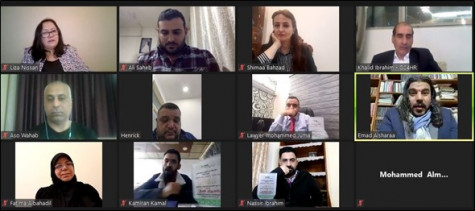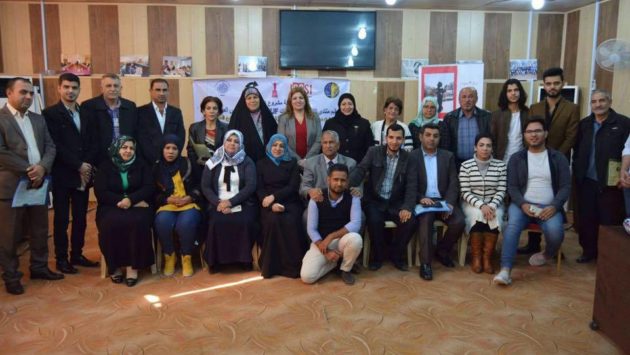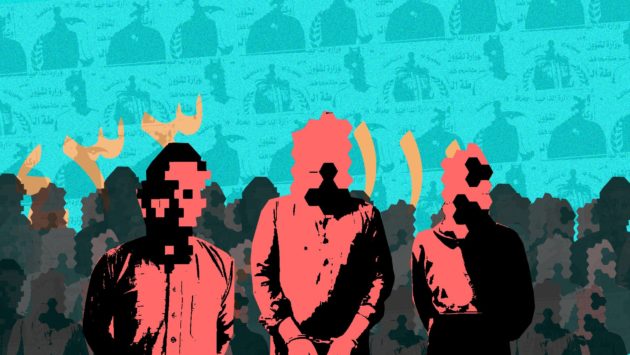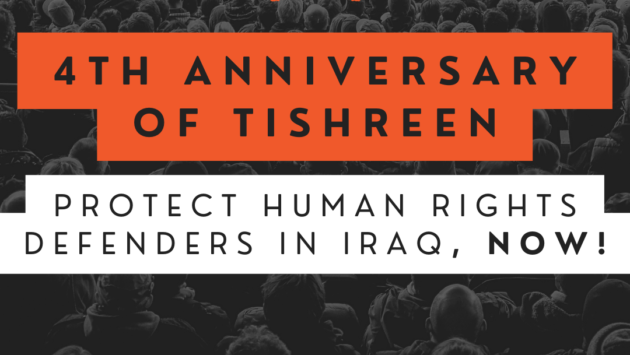GCHR Honours Human Rights Defenders in Iraq at its Second Annual Awards Ceremony
Baghdad – On International Human Rights Day, the Gulf Centre for Human Rights (GCHR) honoured human rights defenders in Iraq at its second annual awards ceremony, which was named in honour of researcher and journalist Dr. Hisham Al-Hashemi. The ceremony was held online, according to health protocols and in order to preserve public health due to the Covid-19 outbreak.
GCHR celebrated the achievements of nine defenders who were present at the ceremony, while everyone joined together to honour the spirit of researcher Hisham Al-Hashemi, who was murdered on 06 July 2020. The event was moderated by journalist Emad Al-Shara’a, who opened it by welcoming everyone. After GCHR Executive Director Khalid Ibrahim welcomed and congratulated all the awardees, he referred to the increasing challenges and constant threats that defenders face in the region in general and Iraq in particular. The ceremony was attended by honourary guest human rights defender and IT expert Mohammed Al Maskati, a representative of Front Line Defenders, and human rights defender Henrick Henry Fosberry, one of the honorees at the first annual ceremony last year.
Who are the defenders?
Liza Nissan Hido: Woman human rights defender Lisa believes in equality between men and women and works hard to combat discrimination against women’s rights, which are fundamental human rights principles. Lisa is the president of the Baghdad Women’s Association, a women’s association established in 2004 that aims to combat all forms of violence against women and girls. Lisa wishes to see Iraqi society reject violence in all its forms and follow the path of achieving fair democracy in contrast to dictatorship.
Aso Wahab: Digital Human rights defender and expert Aso devoted his time to empowering defenders and protecting human rights activists online by providing the necessary advice and training to enhance digital safety for workers in this field. Aso is a digital expert and a member of the board of directors of the Iraqi Network for Social Media (INSM) Blogging Network, a network specialising in the field of digital rights and defending the rights of Internet users and activists. Aso believes that an open, unrestricted Internet is a human right and that digital safety is an essential part of the personal safety of human rights defenders.
Kamiran Kamal: Human rights defender Kameran lives in the stricken city of Sinjar. He spent his life in the poor neighbourhoods of the city and could not join his university for financial reasons and reasons related to displacement, but the stage of displacement and war was an important stage in the life of Kamiran and a real challenge, as he devoted his time to spreading culture, humanity and love between the components and spectra of the Iraqi people through knowledge. His ambition is to build a library to spread culture among society, and he considers knowledge to be an essential part of the principles of human rights. He decided to be one of the sources of knowledge by building the first knowledge library in the city of Sinjar and says: “When I see a book, reading and readers, we will find human rights because the two matters are related.”
Fatima Al-Bahadly: Woman human rights defender Fatima, from the city of Basra in southern Iraq, is the founder of the Iraqi Al-Firdaws Association, an organisation focused on protecting women and girls affected by war and promoting their role in peacebuilding. Al-Firdaws offers literacy, education and skills workshops and works to end violence against women in areas where women are most marginalised, including rural areas. Fatima and her organisation are working to raise awareness among community members about the impact of child marriage and early school dropouts on women and girls, and called on clerics and tribal leaders to recognise the important role women play in society. Fatima also works with the youth to combat the militarisation of society. It also combats the recruitment of children and youth into armed groups and works to reintegrate them into society. Because of this work over the years, Fatima has been subjected to death threats and severe social pressure from her tribe.
Mohammed Joumaa: Human rights lawyer Mohammad has been working as a lawyer and legal expert for 14 years and a courageous activist working on human rights issues. Mohammad believes that legal culture is a basic pillar of human rights in order to know the rights and duties from the legal point of view. Mohammad went to Al-Tahrir Square during the Iraqi protests to explain the articles of the constitution, the election law, the parties, and the mechanism for obtaining individual rights through peaceful and legal means. Mohammad has devoted his life to women’s and children’s rights issues, publishing the negative aspects of the Iraqi legal system towards these marginalised groups and opposing honour crimes. He stood up against attempts by the Iraqi Parliaments to take away custody from mothers of their children, and litigated several cases of marginalised groups in society for free, believing that all rights are one and indivisible.
Ali Sahib: human rights defender Ali works as a secretary in the Iraqi Social Forum, which is a joint space between Iraqi social movements, trade unions and professional unions, civil society organisations, activists and activists for social justice, and the International Initiative for Solidarity with Iraqi Civil Society. “Another Iraq is possible” is the slogan of the Iraqi Social Forum.
Ali devoted his life to the rights of people through the use of peaceful protest and legal methods to obtain rights, and Ali believes that another Iraq full of rights, peace and harmony among all spectrums of its people is possible.
Shaimaa Bahzad: The “Al-Iraqiya is here” blog was established by the woman human rights defender Shaima, as there is no database to know the numbers of creative women in their fields of work and activities in their local communities, so that different parties ignore this success due to the masculine nature of society, and when we demand our rights we are told: Where are the successful women?
Shaima founded the blog on Facebook in 2016 to publish the biographies of creative Iraqi women, and then formed the “Al-Iraqiya is here” team with a group of women and men to organise community campaigns in which creative Iraqi women participate, and provided opportunities for creative women to link them to society through campaigns of a humanitarian and cultural nature between different groups of society. She is supported financially and morally, according to her needs in order to advance her work.
Esmat Al-Basri: For teacher and human rights defender Esmat, visual impairment was not a barrier preventing him from fulfilling his dreams and his responsibility towards his community. Esmat devoted his life to teaching and enabling blind students to cross this barrier and making that a catalyst to achieve their ambitions. Esmat developed his efforts for these students to print braille textbooks, named after French inventor Louis Braille, who created a method for blind people to read, by making prominent symbols on paper, allowing reading through the sense of touch.
Nasser Ibrahim: Human rights defender Nasser took a different concept in communicating human rights to the general public through art. Nasser was distinguished by his satirical and critical caricatures of political life and criticism of negative states present in society. Nasser believes that caricature art is an important and bold expressive art because it carries a message that reaches all classes of society, whether educated or uneducated.
In conclusion, the defenders and the attendees celebrated the work of researcher and journalist Hisham Al-Hashemi, who was assassinated by the forces of darkness who believed only in the language of violence and blood against the word and research – the most powerful tools used by Hisham. GCHR believes it is important to remember Hisham and constantly demand the arrest of the perpetrators and his family’s access to justice, life and the necessary protection they deserve, so we named our second annual awards ceremony after him, in order to bring us all together.




